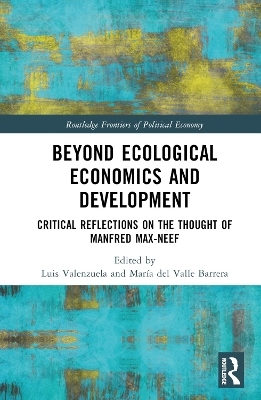
Beyond Ecological Economics and Development
Routledge (Verlag)
978-1-032-46323-0 (ISBN)
The interrelationship among development, environment, and human needs is one of the key issues being faced by the world today. The Chilean economist, Manfred Max-Neef, was a leading thinker on this dynamic, and this book provides both an introduction to and analysis of his work and ideas. Arranged in three main sections – “Human needs and wellbeing”, “Development, growth and sustainability”, and “Methodology of economics” – the chapters in this book contribute to on-going debates on issues as important as human development, the limits of economic growth, deep ecology, sustainable consumption, entrepreneurship, climate change, interdisciplinarity, and the methodology and practice of economics. The contributors to this volume provide a broad range of different critical perspectives on these issues, and the chapters are arranged in dialogue with each other to provide the reader with a rounded view of the legacy of Max-Neef. This book is vital reading for all those interested in ecological economics, environmental economics, development economics, methodology and philosophy of economics, and heterodox economics.
Luis Valenzuela-Rivera is an assistant professor at the Institute of Economics of the Austral University of Chile. He holds a PhD in Economics from the University of Oxford, as well as a Master’s degree in Economics from the University of Oxford and the Pontificia Universidad Católica de Chile. His areas of interest are inequality, technological change, productivity, and the labour market, in addition to the philosophy and methodology of economics. He is an associate member of the Institute for New Economic Thinking at the University of Oxford and adjunct researcher at the Millennium Nucleus on the Evolution of Work (M-NEW). He has been a consultant for the World Economic Forum and advisor of different agencies at the Government of Chile. María del Valle Barrera is an adjunct professor at the Institute of Economics of the Austral University of Chile. She holds a Master’s degree in Rural Development from Austral University of Chile and a PhD in Political Science from Universidad de Cuyo in Argentina. She teaches at the Master’s Programme in Human Scale Development and Ecological Economics at Austral University of Chile. She worked with late Prof. Max-Neef on several projects since 2001, and has specialised in participatory processes of sustainable development and community engagement. As a UNDP consultant, María has worked on energy poverty, climate change, and local governments.
1. Introduction 2. Short biography of Manfred Max-Neef PART I: Human needs and well-being 3. On the contributions of Max-Neef et al. to the theory of human needs. Julio Boltvinik 4. Understanding Max-Neef’s model of human needs as a practical toolkit for supporting development work and societal transitions. Des Gasper 5. A New Development Paradigm Based on Happiness and Well-being: Max-Neef’s Contributions for Building a Better World. Wenceslao Unanue 6. The Human Scale Development approach: is ‘spirituality’ a fundamental human need? Felix Fuders 7. Addressing fundamental human needs: exploring the Human Scale Development proposal for governance and policymaking. María del Valle Barrera & Patricio Belloy PART II: Development, growth and sustainability 8. Overcoming the development discourse: Max-Neef and economic growth. Antonio Elizalde Hevia 9. How Human Scale Development can help to achieve the Sustainable Development Goals for the 2030 Agenda. Ivonne Cruz 10. Climate change and planetary boundaries: an overview from the biocentric perspective of Max-Neef. Clara Olmedo, Iñaki Ceberio de León & Yerko Castillo Ávalos 11. Demand-side, socio-cultural and systemic solutions: the contributions of Max-Neef’s work for climate change and sustainability. Lina Brand-Correa 12. Human Scale Sustainable Development: where Max-Neef’s Fundamental Human Needs meet Sustainability. Gibrán Vita 13. Economic growth and well-being: examining Max-Neef's ‘Threshold Hypothesis’. Luis Valenzuela-Rivera PART III: Methodology of economics 14. The Thinking of Manfred Max-Neef and the Challenge to Neoclassic Economics and Policy Orthodoxy. Andrés Solimano 15. The Gustibulus est Disputandum: building a bridge between mainstream economics and Max-Neef’s theory of fundamental needs. Roberto Pastén 16. Manfred Max-Neef and heterodox economics: influences, and links with Piero Sraffa. Jean Pierre Doussoulin & Yoann Verger 17. The Methodology of Barefoot Economics. Patrick Kletzka 18. Max-Neef’s complete biography
| Erscheinungsdatum | 30.08.2023 |
|---|---|
| Reihe/Serie | Routledge Frontiers of Political Economy |
| Zusatzinfo | 11 Tables, black and white; 6 Line drawings, black and white; 6 Illustrations, black and white |
| Verlagsort | London |
| Sprache | englisch |
| Maße | 156 x 234 mm |
| Gewicht | 453 g |
| Themenwelt | Sozialwissenschaften ► Soziologie ► Spezielle Soziologien |
| Wirtschaft ► Volkswirtschaftslehre ► Wirtschaftspolitik | |
| ISBN-10 | 1-032-46323-6 / 1032463236 |
| ISBN-13 | 978-1-032-46323-0 / 9781032463230 |
| Zustand | Neuware |
| Haben Sie eine Frage zum Produkt? |
aus dem Bereich


